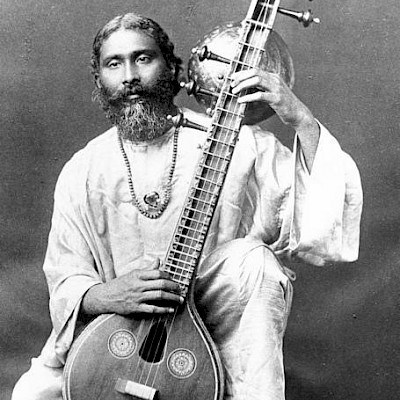Inayat Khan (1882-1927) was born in Baroda, India, to a highly musical family closely associated with the royal court. Inayat's grandfather, Maulabakhsh, was the chief musician for the King of Baroda. Her father Rahmat Khan was a teacher of dhrupad, a classical Indian vocal form. At a young age, Inayat already had a great reputation as a musician, singing and playing for rajas and maharajas throughout India, including the Nizam of Hyderabad, with whom he became a personal friend.
The path of destiny changed for him when he met his Murshid or Sufi guide, Hazrat Sayed Abu Hashim Madani. He found the spiritual food that his soul yearned for. When his murshid was about to leave this life, he told young Inayat to "unite east and west with the music of his soul."
A few years later, in 1910, Inayat sailed for America, accompanied by his brother Maheboob Khan and his cousin Mohammed Ali Khan. Later they were joined by the younger brother, Musharaff Khan. All three were firm companions of Inayat during his work in the West. Known as "The Royal Musicians of Hindustan" they gave concerts in America and Europe. But after a short time, Inayat Khan's lectures on spiritual freedom and many other aspects of life became more important. From these conferences grew a renewed and organized form of Sufism among small groups of people in North America and Europe.
He met a young American woman, Ora Ray Baker, and they married in England in 1913. Together they had four children: Noor-un-Nissa, Vilayat, Hidayat, and Khair-un-Nissa (who used the name Claire). Although they finally settled in Suresnes, on the outskirts of Paris, during the sixteen years that Inayat spent in the West he traveled incessantly, lecturing, teaching, inspiring many, and sowing the seeds of wisdom wherever hearts were ready to receive them. In 1926, he returned to India for a visit, and after a brief illness, he passed away in Delhi in 1927.
More than a dozen volumes of Inayat Khan's lectures, sayings and inspired poetry have been published. His work has been continued by many devotees. In addition to the International Sufi Movement he founded, several other organizations arose in his wake, each offering a particular interpretation of the universal Sufi message.
Out of reverence, Inayat Khan is called Pir-o-Murshid Hazrat Inayat Khan. "Hazrat" is an honorific and significant spiritual dignity. The title "Pir-o-Murshid" means that he was the head of the Inner School of the Sufi Movement. (https://www.nodualidad.info/maestros/hazrat-inayat-khan.html)
